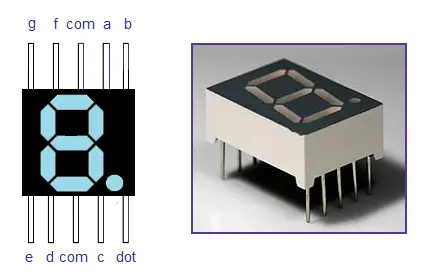Seven segment display is a device that
can display decimal numbers and are widely used in electronic clocks,
electronic meters, digital display panels and a hand full of
applications where numerical data is is displayed. The idea of seven
segment display is very old and they are in the scenario from early
nineteenth century. Seven segment display have seven segments which can
be individually controlled (ON/OFF) to display the desired number.
Numbers from 0 to 9 can be displayed using various combinations of the
segments and in addition to this the hexadecimal letters A to F can be
also displayed using a seven segment display. The seven elements
(segments) are arranged in the form of a square shaped “8″ which is
slightly inclined to the right. The slight inclination to the right is
given to improve the readability.Some seven segment displays have an
additional dot element which can be used for indicating decimal points.
The segments may be based on incandescent bulbs, fluorescent lamps, LCD
or LED. Here in this article we give stress to the LED seven segment
display.
In an LED 7 segment display, as the name
indicates the 7 segments plus the dot segment are based on LEDs. When
power is given to a particular segment, it glows and the desired digit
can be displayed by powering the suitable combination of LEDs. LED seven
segment displays are of two types, common cathode and common anode. In a
common cathode display, the cathode of all LED segments are tied
together as one common cathode pin and the anode terminals are left
alone as input pins. In this scheme the common cathode is always
connected to ground and the control signals (active high) are applied to
the inputs (anode terminals) .In common anode type display, the anodes
of LED segments are tied together as one common anode and the cathode
terminals are left alone as input. In this configuration the common
anode is always connected to a suitable positive voltage and the control
signals (active low) are applied to the inputs (cathode terminals).

No comments:
Post a Comment